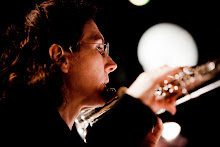While working as a psychology professor at Hebrew University in the 1960s, Kahneman lectured a group of Israeli air force flight instructors on behavior modification. As a well-read mother of an almost-three year old, I know about behavior modification: rewarding positive behavior works but punishing mistakes does not. Almost every other parenting book will tell you this. My husband does not agree, but that is another story.
When I read the following passage though, my first connection was not to my son, dear as he is, but to teaching flute. I listen to some teachers brag about how tough they are and now believe they are driven by a misconception. Perhaps more importantly, this will give us a lesson on how not to talk to ourselves, as we practice for hours on end, give concerts, and play auditions. I'll begin quoting from page 7, just mentally replace the word "flight" with "flute":
Kahneman drove home the point that rewarding positive behavior works but punishing mistakes does not. One of [the pilot instructors] interrupted,..."I've often praised people warmly for beautifully executed maneuvers, and the next time they do worse," the flight instructor said. "And I've screamed at people for badly executed maneuvers, and by and large the next time they improve. Don't tell me that reward works and punishment doesn't work. My experience contradicts it." The other flight instructors agreed. To Kahneman the flight instructor's experiences rang true. On the other hand, Kahneman believed in the animal experiments that demonstrated that reward works better than punishment. [...] And then it struck him: the screaming preceded the improvement, but contrary to appearances it did not cause it.
How can that be? The answer lies in a phenomenon called regression toward the mean. That is, in any series of random events an extraordinary event is most likely to be followed, due purely to chance, by a more ordinary one. Here is how it works: The student pilots all had a certain personal ability to fly fighter planes. Raising their skill level involved many factors and required extensive practice, so although their skill was slowly improving through flight training, the change wouldn't be noticeable from one maneuver to the next. Any especially good or especially poor performance was thus mostly a matter of luck. So if a pilot made an exceptionally good landing - one far above his normal level of performance - then the odds would be good that he would perform closer to his norm - that is, worse - the next day. And if
his instructor had praised him, it would appear that the praise had done no good. But if a pilot
made an exceptionally bad landing - [...] then the odds would be good that the next day he would perform closer to his norm - that is, better. And if his instructor had a habit of screaming "you clumsy ape" when the student performed poorly, it would appear that his criticism did some good. In this way an apparent pattern would emerge: student performs well, praise does no good; student performs poorly, instructor compares student to lower primate at high volume, student improves. The instructors in Kahneman's class had concluded that their screaming was a powerful educational tool. In reality it made no difference at all.
But I was going for that high D!
So the next time you or anyone else crash and burn, it's fine to mull it over and figure out what went wrong, but it doesn't pay to be an asshole about it. And besides, aren't apes higher primates?






